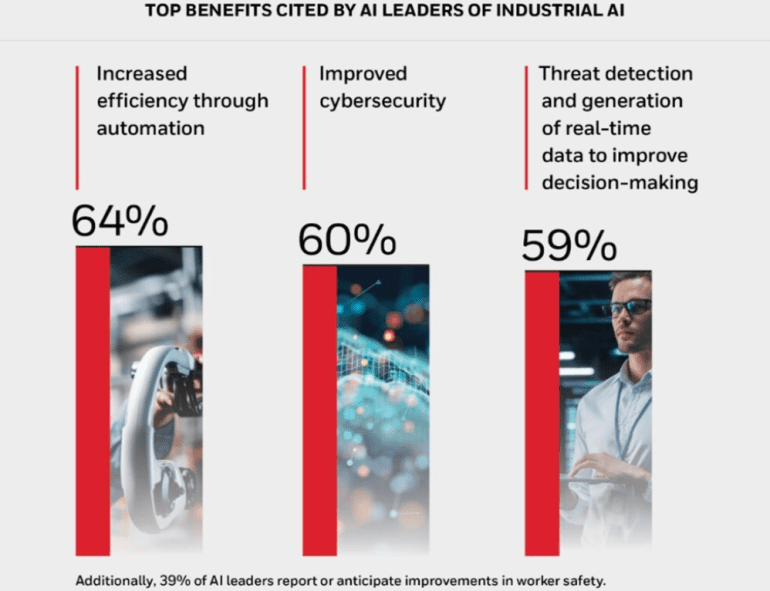- Only 17% of AI decision-makers have fully implemented their initial AI plans.
- Over 90% of respondents are discovering new AI use cases in various stages of implementation.
- 94% of AI leaders plan to increase their AI investments.
- Key benefits of AI include increased efficiency (64%), improved cybersecurity (60%), and enhanced decision-making (59%).
- Additional advantages cited: greater work flexibility (49%), job satisfaction (45%), skills development (44%), and workplace safety (39%).
- AI helps address skills shortages by upskilling and reskilling workers.
- Challenges include a lack of understanding among C-Suite executives (37%) and difficulties in securing resources (48%).
Main AI News:
Honeywell’s latest global research study, “Industrial AI Insights,” provides a comprehensive look into the current state of Artificial Intelligence (AI) within the industrial sector. Despite only 17% of AI decision-makers having fully implemented their initial AI strategies, the majority of those surveyed are discovering new and unexpected use cases across various stages of AI adoption.
The study highlights a strong commitment to expanding AI utilization, with 94% of AI leaders expressing intentions to increase their investment in AI technologies. “There is no question that AI is currently at a pivotal moment,” remarked Kevin Dehoff, Honeywell’s Chief Strategy Officer. He noted that advancements in Generative AI and the availability of more data from advanced analytics position Industrial AI for significant growth, promising considerable opportunities for revenue and employee satisfaction.
AI’s Impact on Workplace Efficiency
The research underscores AI’s transformative impact on workplace efficiency and productivity. Nearly two-thirds (64%) of AI leaders identify efficiency gains as a key benefit of AI, while 60% highlight improvements in cybersecurity and threat detection. Additionally, 59% attribute better decision-making to AI’s capacity for real-time data generation.
Respondents also reported several advantages of AI for workers, including:
- Increased work flexibility (49%)
- Greater job satisfaction (45%)
- More time for skills development and creative thinking (44%)
- Enhanced workplace safety (39%)
As industries face a growing skills gap due to retiring baby boomers and fewer replacements entering the workforce, AI’s role in upskilling and reskilling becomes increasingly vital. AI helps elevate worker capabilities, thereby improving job satisfaction and productivity while addressing the skills shortage.
Lucian Boldea, President and CEO of Honeywell Industrial Automation, illustrated this point with an example: “There can be tens of thousands of instruments, equipment, and valves needed to process and manufacture a product, many of which require highly experienced technicians for operation and maintenance. With AI training and AI as a ‘co-pilot,’ less experienced technicians can be quickly elevated to higher skill levels, enabling safer and more reliable plant operations by reducing human error.”
Challenges and Future Directions
Despite the enthusiasm for AI, challenges remain. Over a third of respondents (37%) believe their C-Suite lacks a full understanding of AI’s functionality, and nearly half (48%) report ongoing difficulties in securing necessary resources for AI implementation.
Billal Hammoud, President and CEO of Honeywell Building Automation, commented on AI’s future role: “Businesses recognize that AI is reshaping our world and creating new opportunities. For building operations, such as hospitals and offices, AI’s ability to control HVAC, lighting, and electricity usage enhances safety, operational efficiency, and sustainability.”
Conclusion:
The findings from Honeywell’s research underscore a strong and growing commitment to AI within the industrial sector, driven by the technology’s ability to uncover new use cases and deliver substantial benefits in efficiency, security, and decision-making. The industry’s enthusiasm for expanding AI adoption indicates a transformative shift that could address ongoing skills shortages and enhance operational productivity. However, challenges such as executive understanding and resource allocation need to be addressed to fully leverage AI’s potential. The market is likely to see increased AI integration as organizations continue to demonstrate clear improvements in business performance through advanced AI applications.

